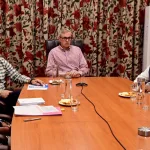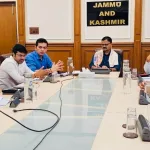In the first-ever report of its kind, the World Health Organisation Council on the Economics of Health for All has outlined a bold new path to reorient economies to deliver what matters – health for all.
The Council, created by WHO Director-General Dr Tedros Adhanom Ghebreyesus in November 2020 in response to the COVID-19 pandemic, and chaired by Professor Mariana Mazzucato, has spent that last two years rethinking the economy from a health for all perspective, and pushing forcefully the principle that human and planetary health must be at the heart of how we design our social, health and economic systems and policies.
The Council in a recent meeting has put forward a bold new narrative grounded in new economic wisdom to reorient economies to deliver health for all across four interrelated themes; Value – valuing and measuring what matters through new economic metrics; Finance – how to finance health for all as a long-term investment, not a short-term cost; Innovation – how to advance health innovation for the common good and Capacity – how to strengthen dynamic public sector capacity to achieve health for all.
“Two years ago, I asked a team of the world’s leading economists and public health experts – all women – to create a paradigm shift. Now, instead of health for all being seen as the servant of economic growth, we have a roadmap for structuring economic activity in a way that will allow us to reach the goal of seeing all people with access to essential health services faster with better results,” Dr Tedros has said.
“Over the past two years, the WHO Council on the Economics of Health for All has worked to craft a new economic narrative – one that transforms financing for health from an expenditure to an investment, we have examined the changes needed – including to the structure of patents, public-private partnerships, and budgets – to design an economy that delivers Health for All. In our final report, we call for new economic policy that is not about market fixing but about proactively and collaboratively shaping markets that prioritize human and planetary health,” Council’s Chair, Professor Mariana Mazzucato has said in the meeting.
Key recommendations include
We need to value and measure the things that truly matter – human and planetary flourishing – rather than pursuing economic growth and GDP maximization regardless of the consequences. To achieve health for all, governments must rethink value and reshape and redirect the economy based on social and planetary well-being, guided by new metrics.
A fundamental overhaul of national and international systems for financing health is needed, so that spending on health is treated as a long-term investment. Delivering Health for All will require both more money, and higher quality financing.
Innovation requires collective intelligence—it is never the fruit of just one company or government agency. But unless innovation is governed for the common good, many people remain excluded from its benefits. A new end-to-end health innovation ecosystem that prioritises the common good is needed.
As the COVID-19 pandemic has made clear, the quality and capacity of government matters. Effective governments are not the smallest, but those that are well-designed and properly resourced, both financially and in terms of their people and infrastructure. Re-investing in government capacity is crucial to delivering Health for All.
The report also provides suggestions on what can be done in practice to implement the changes needed to reorient measures of economic value, the financing of health, innovation and building public sector capacity in the service of health for all. Among these, the report mentions several examples, including:
The mRNA technology hub facility in South Africa: a values-driven system that tries to get the innovation, financing and capacity right ex-ante; Brazil’s public investment in a health-industrial complex that serves the common good; Regional development banks as enablers of change in the Global South; The Wellbeing Economy Alliance – an alliance of several governments and over 600 other organizations working together to transform economic systems in the service of life; Approaches to financing national action plans (NAPs) on antimicrobial resistance through multi sector joint budgeting, given that most NAPs remain unfunded.
The recommendations included in the report could change the way countries view and finance health. WHO calls on policy-makers, civil society, and members of the health and economics communities to give full consideration to the recommendations and use them as a compass to develop new economic policies and structures that can move us along the road to making health for all a reality.
Meanwhile on May 23, 2023 country delegates across the world considered a number of emergencies-related items, as Items 14 and parts of item 15 were grouped together in the meeting. They provided their views on the reports from the Independent Oversight and Advisory Committee for the WHO Health Emergencies Programme (IOAC), on implementation of the International Health Regulations, on WHO’s work in emergencies, as well as in strengthening preparedness for and response to emergencies. Countries also discussed the report on the health situation in Ukraine, and the report of the Global Health for Peace Initiative.
Delegates commended WHO’s work in emergencies throughout the pandemic and beyond, agreeing with the findings of the IOAC that the work was excellent, but that the Emergencies programme was underfunded and overstretched. Some delegates highlighted the role that the Contingency Fund for Emergencies has played in allowing the organization to respond quickly.
They encouraged global efforts for strengthening preparedness and response to health emergencies, learning the lessons of the COVID-19 pandemic, and reiterated the importance of an aligned global health architecture, placing WHO at the centre. Several spoke of the need to align various initiatives to avoid duplication and strengthen their impact. Some noted the need for continued work to prevent sexual exploitation and abuse. Delegates spoke in support of the Global Health for Peace initiative, and the strengthening of clinical trials, asking WHO for further guidance and support to build capacities in country in this area, to improve the quality of research and interventions.
(The author is a regular columnist and can be mailed at [email protected])





